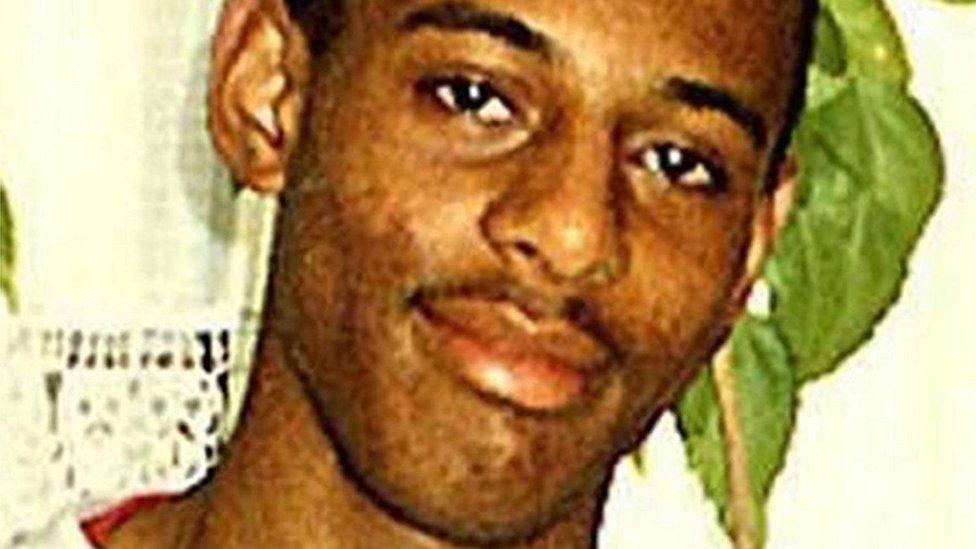Doreen Lawrence: Knife crime plans criminalise children
- Published
"Teach kids the realities of knife crime."
The mother of murdered teenager Stephen Lawrence has criticised a new scheme by the government to tackle knife crime.
The Home Secretary announced plans for Knife Crime Prevention Orders last week, targeting suspects aged 12 and over - even if they don't have a blade.
But Baroness Lawrence said there were better ways to deal with knife crime than "criminalising" children.
The Home Office said the scheme would prevent young people from routinely carrying a knife.
Stephen Lawrence was stabbed to death in an unprovoked attack in south-east London in 1993, aged 18.
Labour peer Baroness Lawrence was speaking to the Home Affairs Select Committee ahead of the 20th anniversary of the Macpherson report, which looked into how the case was handled by the police.
It concluded that there had been "institutional racism" in the force and made 72 recommendations for the police to follow.
Baroness Lawrence, who has campaigned for police reforms since the murder of her son, told the committee: "What is really worrying now is [what] the home secretary has announced about 12-year-olds carrying knives, so these kids are going to have a criminal record from the age of 12 and are going to be locked up.
"You are going to start criminalising [them] at the age of 12.
"Now I am sure there are other ways of dealing with that."
She called on the government to start going into schools to educate all children on what could happen if they carry knives.
"Kids who have been to prison or youth offenders... come out with a completely different way of dealing. Get those kids in to talk to them," said Baroness Lawrence.
"The older generation doesn't actually reach them, so you need the peer to go in and speak to those kids and let them know what the reality is."
Sajid Javid says the Asbo-style orders would give police more powers to prevent knife crime
Baroness Lawrence said young black people also needed to be shown role models, rather than just negative ways in which their lives could turn out.
"Society has put a label on them that they are always up to no good, that they don't achieve anything, but that is not the case," she said.
"[They don't] see how many young people have gone off to university. It is always negative. They believe, 'I can't do any better'.
"They never see the positive side, we need to be able to do that more."

Stephen Lawrence was stabbed to death as he waited at a bus stop
Speaking later to the committee, the chairwoman of the Metropolitan Black Police Association highlighted that those role models may not be there in the police force, claiming diversity had "gone backwards".
Det Sgt Janet Hills said there had been great strides in recruiting women into the police - with forces reaching a "tipping point for cultural change" - but that a "gap has developed" with a lack of policewomen from African, Asian or Caribbean backgrounds.
"When you look at the success of African, Caribbean and Asian heritage women within [recruitment], we are nowhere to be seen," she said. "We have become invisible to the organisation, so you can have police organisations up and down the country that do not have any black females in them.
"If you turned that on its head and said we have constabularies without any women in them there would be a public outcry.
"But because we have become invisible to the organisation, that is how we are being missed. We are not being progressed and we are not being targeted around representing our communities within the police services."
Baroness Lawrence said it was key for the force, and other institutions, to represent the public they serve.
"I was trying to find out about progression of officers... and when you look at the top table, how many people of colour do you see there? Not many."
She added: "You need good leadership and… you don't have leadership that represents community."
A Home Office spokesperson said the prevention orders would stop vulnerable young people from routinely carrying a knife and becoming involved in knife crime. The aim is preventative, and would not result in a criminal record.
They said it was a core part of the Serious Violence Strategy - to address the root causes of violence by working with a range of agencies to focus on early intervention alongside strong law enforcement.
Nearly £18m would be provided over the next two years through the Early Intervention Youth Fund to help Police and Crime Commissioners and Community Safety Partnerships, they said.